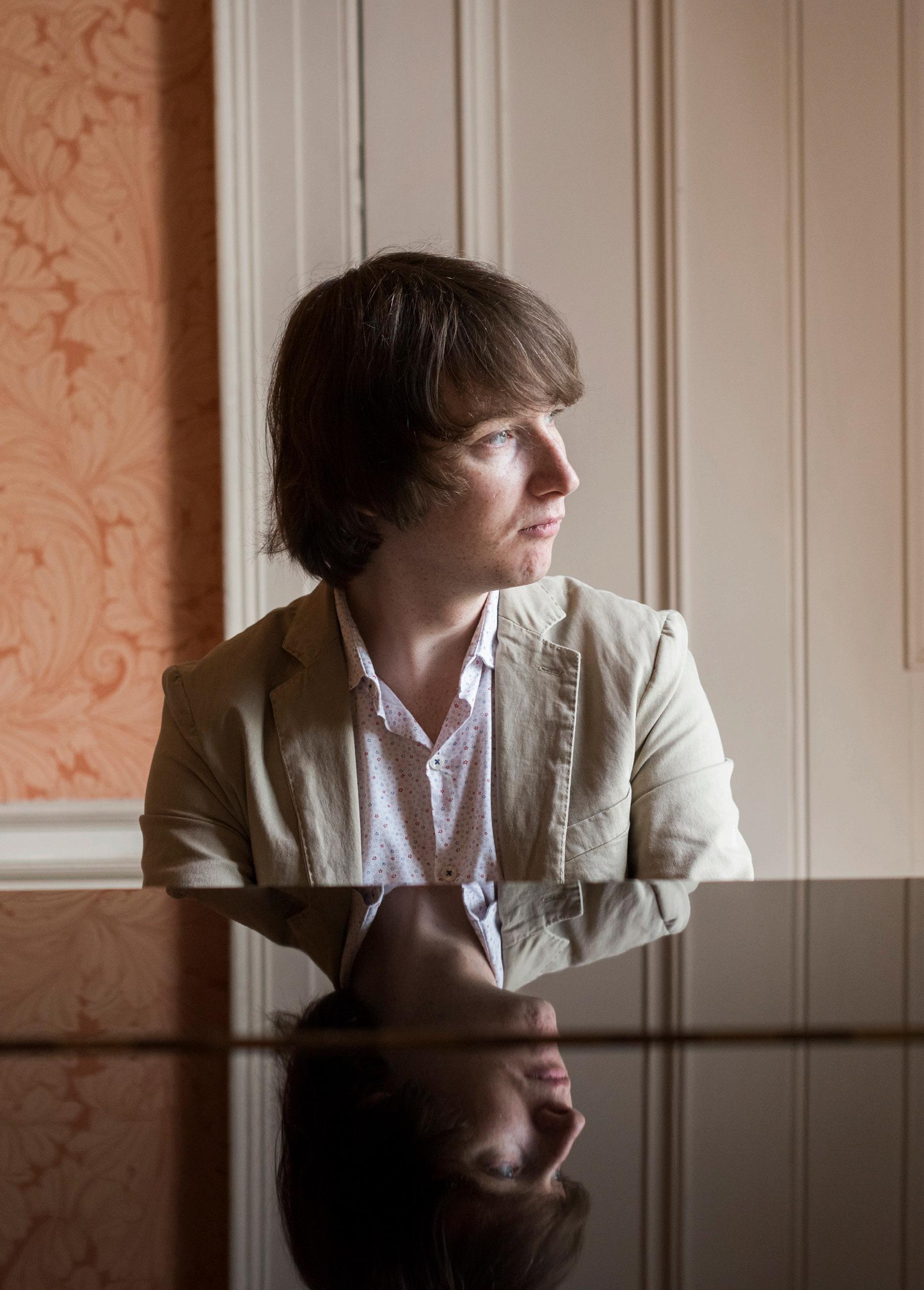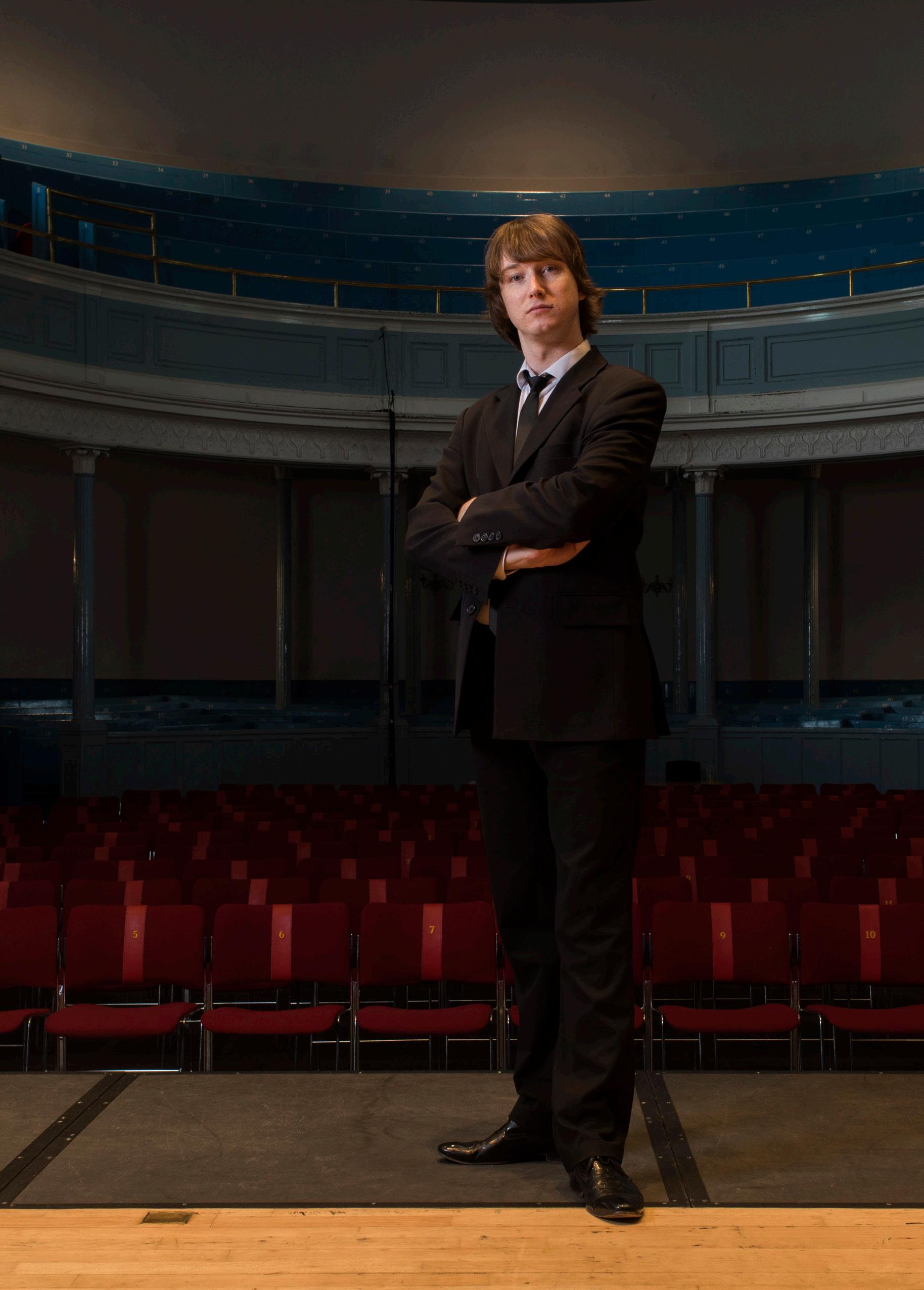
5 minute read
Meeting Maxim
By Journalist Keith Bruce

“Becoming a musician was never a question for me,” says Maxim Emelyanychev. What the Scottish Chamber Orchestra’s new Principal Conductor means is that his course in life has been clear for as long as he can remember. No other career ever suggested itself. Maxim’s English is much better than he modestly suggests, but strictly speaking he is saying that a musical future was never in question.
“My father is a trumpet player and my mother is a singer, and I was taken to my first orchestral concert when I was three years old,” he continues. “My father used to bring me musical scores to read when I was very small, and I began to play the piano and to sing in a boys’ choir. They are very popular in many Russian cities and I was singing the Stabat Mater of Pergolesi when I was very young.”
It is perhaps then another auspicious step in his new relationship with the SCO, that Maxim steps in to conduct the first appearance by the SCO Chorus this season, when he replaces an indisposed Bernard Labadie on the podium for Haydn’s The Seasons on October 11 and 12. It was when he deputised for Robin Ticciati for a programme of Schubert and Dvořák in March that the players, audiences and critics were unanimous in their praise. The musicians of the SCO had found their successor to the departing Robin, and the sixth Principal Conductor in the Orchestra’s history was appointed. Indeed, my review in The Herald pointed out that Maxim “produced some of the most robust playing we have heard from the SCO musicians this season.”
Maxim attended a music school from the start of his education, although he hastens to point out that mathematics, physics and languages were also on

the curriculum. He recognises, however, that he was fortunate in being directed towards conducting when he was just 12 years old, alongside his keyboard studies. “Conducting can often be something to do in the second half of a professional career, so it was good to start early. My teachers recognised that I had the necessary reflexes.”
Learning conducting technique joined other disciplines including composition and obligatory participation in piano competitions, although Maxim says it was just as important to his musical development that he was regularly playing piano and celeste in the company of other musicians in an orchestra. His first study was piano when he moved on to music college and then the Moscow Conservatory, but he was encouraged to continue his conducting in parallel. A turning point in his practice came at the age of 16. “A few months before the entrance exam I was invited to conduct a youth symphony orchestra as well as being the soloist in Mozart’s 11th Concerto. And I wanted to give an authentic performance, especially of the Cantabile slow movement.”
Influenced by his listening to the recordings by conductors Trevor Pinnock and Frans Brüggen and counter-tenor Michael Chance, the young Maxim directed the orchestra from the harpsichord and started his studies determined to continue to do both, although the conservatoire was not really geared up for such an ambition.
“It is difficult to do both because you should really pay extra,” he explains. With supportive teachers, however, ways were found for him to receive extra tuition. And although his

invitations to join the SCO have so far not included showcasing his keyboard skills, directing the orchestra from the keyboard is on his agenda for possible concerts in the future. And he remains fascinated by the lessons of historically-informed performance.
“Of course you can play Mozart on modern instruments; you can do the music in any way. But it is good to give natural trumpets to good players, and hear the authentic sound of early music. Trumpets and timpani in particular have changed a lot since those days. “Maybe we could do a concert with gut strings, but the most important thing is how you perform the music. It has to work as it did in those times, but Bach played on a quartet of saxophones can still be authentic.”
That is only one aspect of the music he hopes to conduct with the Orchestra, he quickly adds. With no immediate ambitions to tackle Mahler, Bruckner or Strauss (“they will come later,” he says), his list of potential inclusions in the repertoire is a long and inclusive one. “Italian baroque, early Romantic German and Austrian music, 20th Century French and Russian, I have no preference,” he says, noting in passing the close relationship between composers in the last category, with Ravel orchestrating Mussorgsky and Stravinsky’s admiration for ‘Les Six’.
For a musician of his generation, the politics of the 20th century that separated composers, and sometimes brought them together, is from the history books. “I don’t remember anything of the Soviet Union, but how to live in this country is still a question now - how to start to be open and smile.
It is important that there is music in all places, in the street and in the church ... I think we can do some programmes that allow me to see more of the beautiful and interesting places in Scotland
“Prokofiev and Shostakovich created art, so although the time when they lived is important, music is higher than this level of politics. It is like with poetry: Pushkin and Shakespeare were writing about things in their time, but now we do not care about that. The beauty of their work is more important than that.”
Maxim also hopes to extend his practice in Scotland beyond the boundaries of the classical canon, and sees real possibilities for the creation of a new concert hall in Edinburgh to break down barriers and encourage crossover collaborations with Scottish folk and renaissance music. “It is important that there is music in all places, in the street and in the church as in earlier times, while now we just go to concerts between seven and nine o’clock. I think we can do some programmes that allow me to see more of the beautiful and interesting places in Scotland.”
––––––Maxim Emelyanychev Conducts Haydn The Seasons with SCO Chorus on 11-12 October in Edinbrugh and Glasgow ––––––The Edinburgh concert is proudly sponsored by











